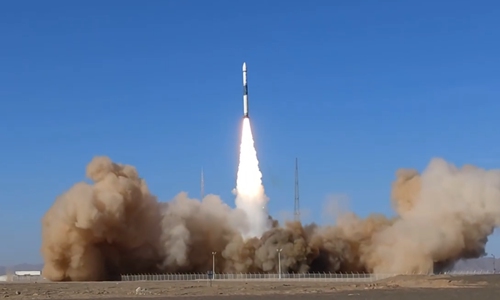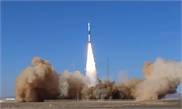SOURCE / INDUSTRIES
Chinese space firms to scale new heights, inspired by national support, SpaceX’s success
Chinese players inspired by national support

As they emerge from disruptions caused by COVID-19 pandemic, Chinese players in the commercial space sector - both state-owned and private - are accelerating their investment in research and development (R&D), as well as the production of rockets and satellites, to ride on the historic opportunity that China is encountering.
After the satellite internet was added to the country's "new infrastructure" program earlier this year, domestic space firms became more motivated, especially private ones that have mushroomed in recent years. Aerospace experts said that there is also an external stimulating factor - US-based SpaceX, which has launched more than 800 satellites.
Featuring low-cost solid-fuel space vehicles with high reliability and a short preparation period, the Kuaizhou series rockets have been going through an intense period of assembly and tests, Cao Meng, head of marketing of the Kuaizhou team, told the Global Times on Tuesday.
Operated by Expace, a commercial company, the Kuaizhou rockets are backed by the China Aerospace Science and Industry Corp (CASIC). The vehicle was designed to launch low-Earth and Sun-synchronous orbit satellites.
Work resumed in early April in Wuhan, the Chinese city that was hardest-hit by the coronavirus. That's where the Kuaizhou rocket industrial park is based, and the team has been accelerating its pace in rocket production and tests.
The park, partially put into operation in May, is expected to be capable of assembling and testing of more than 20 solid-fuel carrier rockets annually.
The number of annual launches of the Kuaizhou series rockets will double by 2023 and China will develop world-class solid propulsion technology by 2025, said Fu Zhimin, chief engineer of the CASIC, during the 6th China (International) Commercial Aerospace Forum on Monday, according to the Xinhua News Agency.
Yang Feng, CEO of Spacety, a private small-satellite maker with offices in Beijing and Changsha, Central China's Hunan Province, told the Global Times on Tuesday that the company plans to expand into other Chinese cities. It can produce 30 satellites a year.
"It's a historic opportunity for us to ride on the flourishing commercial space industry in China, and the demand for satellite application is also surging," said Yang.
"We plan to have more than ten satellites sent into space next year," he added.
Separately, the underground part of the first phase of satellite producer Commsat's factory has been completed, and the main structure will be capped by end of this year, the firm said on Monday.
Commsat announced in September that it started to build a satellite factory in Tangshan, North China's Hebei Province, with annual production of more than 100 satellites, which will each weigh more than 100 kilograms.
The rollout of "new infrastructure", which puts the satellite internet into national projects together with 5G networks, the industrial internet, big data centers and artificial intelligence, has spurred domestic commercial firms to expand their layout in the sector, said Lan Tianyi, founder of Beijing-based Ultimate Blue Nebula Co, a space industry consultancy.
Lan told the Global Times on Tuesday that satellite internet's inclusion has boosted the upstream and downstream ends of the commercial space industry chain.
"As for external motivation, that's exactly what SpaceX has achieved. The US firm's disruptive technologies have rewritten the trend of the space sector, and it has proved the feasibility of its technology path, lighting the way for domestic players," said Lan.
A SpaceX Falcon 9 rocket fired 60 more Starlink internet relay satellites into orbit over the weekend, bringing the total delivered into orbit to more than 800.
Beijing-based private rocket firm LandSpace has been dubbed as the best Chinese answer to SpaceX, because it aimed high in terms of breaking technology barriers, achieving high-reliability, low-cost, medium-sized and large liquid rocket products at the beginning of its life. The company took the lead in the technology route of liquid-oxygen methane engines.
SpaceX's Falcon 9 rockets rely on a combination of liquid oxygen and rocket-grade kerosene propellant.
"China's commercial space sector is still at the early phase," said Lan.
"If a landmark event happens in the next few years, for example, if LandSpace's liquid-oxygen methane rocket is sent into orbit successfully, it will usher in a new phase," he noted.


